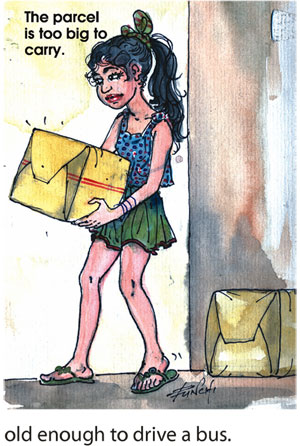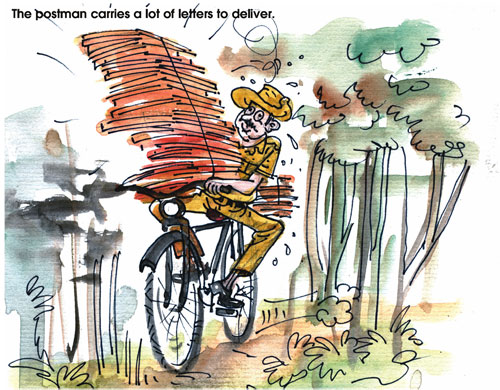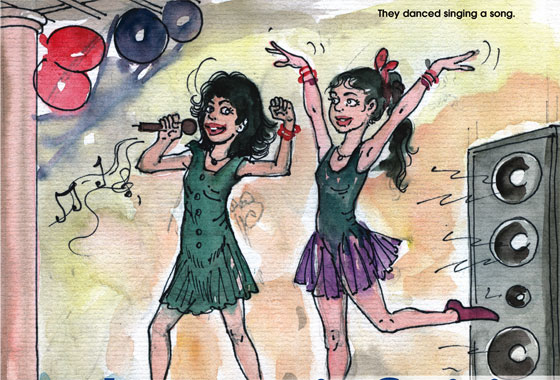|

by R. S. Karunaratne
Adjectives with ‘enough’ or ‘too’ + infinitive
Middle age: the age when you’re too old to play tennis and too young
to play golf.-Ansel Adams
After an adjective + ‘enough’ we can use an infinitive with ‘to.’
Kamal is 22 and he is old enough to drive.

Jane is 14 and she isn’t old enough to drive.
In Britain if a child is 13, he is old enough to work part-time.
Amanda is 12 and she is not old enough to work part-time.
In Britain a child who is 16 is old enough to leave home.
Brian is 14 and he is not old enough to leave home.
In Britain a child of 16 is old enough to leave school.
Sam is 14 and he is not old enough to leave school.
In Britain a youth of 17 is old enough to drive a car.
Dan is 15 and he is not old enough to drive a car.
A youth of 18 is old enough to vote.
Lal is 16 and he is not old enough to vote.
If you’re 18, you are old enough to change your name.
Wilson is 16 and he is not old enough to change his name.
In Britain if you are 21, you are old enough to drive a bus.
Rockwood is 19 and he is not old enough to drive a bus.
After ‘too + adjective’ we use an infinitive with ‘to.’
Grandfather is too old to drive.
Nethmi is too ill to work.
Nelson is too old to travel.
I am too bored to listen to the lecture.
The child is too hungry to do his homework.
We use ‘too + adjective + infinitive’ in a different way.
The parcel is too big to carry.
It’s too cold to drink.
This work too difficult to do.
The box is too heavy to lift.
The curry is too salty to eat.
The iron is too hot to handle.
Some parts of the machine are too small to see.
The letters are too small to read.
We use infinitives with ‘to’ after nouns.
I have got some work to do.
I haven’t got any money to give you.
He has no shirt to wear.
I have no friends to associate with.
The postman carries a lot of letters to deliver.
She has a lot of work to do today.
Grandmother has many stories to tell me.
I have many videos to watch during the holidays.
We use infinitives with ‘to’ after words such as ‘somebody, anything,
nothing and ‘nowhere.’
Would you like something to eat?
There is nothing to see here.
She hasn’t got anything to read.

Some poor people have nowhere to live.
I’m not attending the wedding; I have nothing to wear.
Although he is paid well, he has nothing to do here.
Here is an interesting poem by Lewis Macha.
Nothing to eat
She had nothing to eat
They made a film about her because she had nothing to eat
Her husband was killed in the war.
They wrote a book about how he was killed in the war.
Her mother and brother were executed by the revolutionaries.
There was an opera about it.
Both her children died
(There was no hospital).
You can see the photographs at an exhibition in London.
Then somebody wrote a poem.
Still she had nothing to eat.
Match words and meanings
Here’s an exciting way of enriching your vocabulary. Match the words
in column ‘A’ with the meanings in column ‘B’ and check your answers
with the key. The first has been done for you.
Column A:
Y 1. clip-clop
.... 2. clippers
.... 3. clipping
.... 4. clique
.... 5. clobber
.... 6. clod
.... 7. closeness
.... 8. closet
.... 9. clot
....10. clothed
... 11. cloud-burst
... 12. cloudless
... 13. cloudy
... 14. clout
... 15. clove
... 16. cloven
... 17. clown
... 18. club
... 19. clubber
... 20. clubhouse
... 21. clueless
... 22. clump
... 23. clumsy
... 24. clutter
... 25. coalface
Column B:
A. the surface from which coal is cut
B. a state of being untidy
C. awkward in movement
D. a group of trees
E. a sudden heavy fall of rain
F. having no knowledge of something
G. wearing clothes
H. a building where club members meet
I. somebody who goes to a nightclub
J. an organisation of people with a common purpose
K. being close in position or time
L. an entertainer who wears funny clothes
M. divided into two parts
N. a cupboard or a small room with a door
O. a small part of a bulb of garlic
P. to hit somebody with the hand
Q. a piece that has been cut off something
R. with clouds
S. with no clouds
T. a device for cutting nails
U. to hit somebody hard and repeatedly
V. a piece of soil or clay
W. an almost solid piece of something
X. a small group of people
Y. a sound like that of horses’ hooves on a hard surface
Key:
2. T 3. Q 4. X 5. U 6. V 7. K 8. N 9. W 10. G 11. E 12. S 13. R 14. P
15. O 16. M 17. L 18. J 19. I 20. H 21. F 22. D 23. C 24. B 25. A
Starters:
Verb + to - infinitive
After some verbs we use a ‘to - infinitive.’
I expected to get my results next week.
Nayana agreed to work late at the bank.

We cannot afford to buy a car.
Are you happy to get a job in Australia?
My brother has offered to help me when I move to Melbourne.
We use ‘not’ before the ‘to - infinitive.’
My uncle has decided not to get married.
She managed not to lose her temper.
With certain verbs we use the ‘-ing’ form, not a ‘to - infinitive.’
Mother has finished cooking.
Mark has finished playing cricket.
She remained looking the other way.
They danced singing a song.
We waited expecting the next train.
We use a ‘to - infinitive’ after ‘seem’ and ‘appear.’
Sarah seems to be an efficient girl.
The injured man appears to have fallen off a bus.
The officer didn't seem to know the office routine.
The child appeared to have hurt himself.
Tend, manage and fall
We use ‘tend to’ for things that usually happen.
Children tend to get up late on holidays.
We use ‘manage to’ for being able to do something.
He managed to pass the examination in his fifth attempt.
We use ‘fail to’ for things that do not happen.
He has failed to pay his electricity bill.
We use some nouns before ‘to - infinitives.’
What about your promise to come with me?
Have you forgotten your promise to go shopping?
We have an agreement to hold office only for three years.
She has a great desire to be a ballerina.
Your offer to help me is very much appreciated.
[Activity]
Fill in the blanks with the following words and check your answers
with the key. decided, demanded, offered, promised, threatened, managed,
failed, wanted, arranged, expected
1. The workers ........... to strike.
2. Malini ............... to speak to the director.
3. A stranger .................. to help us in Nigeria.
4. The minister ............. to look into their grievances.
5. A coalition party has ............ to withdraw support.
6. He ............. to pass the examination in his second attempt.
7. I ................ to find a job in Singapore.
8. She ............ to become an actress.
9. They ................ to accommodate us for two days.
10. We ............. to see the hermit but he was not there.
Key:
1. decided 2. demanded 3. offered 4. promised 5. threatened 6.
managed 7. failed 8. wanted 9. arranged 10. expected
Quiz on idioms
An idiom is a kind of phrase. It is a group of words which have a
different meaning when used together from the one it would have if the
meaning of each word were taken individually. Tick the meaning of the
idioms in bold type and check your answer with the key,
1. If there is bad blood between two people ...
(a) they have hostile feelings towards each other
(b) they have friendly feelings towards each other
(c) they are suffering from the same disease
2. If people are baying for blood ...
(a) they are demanding that a commission should be appointed
(b) they are demanding that a particular person should be promoted
(c) they are demanding that a particular person should be punished
3. Blood is thicker than water means ...
(a) blood contains more nutrients than water
(b) your loyalty to your family is greater than your loyalty to anyone
else
(c) your anger cannot be appeased
4. If a task involves blood, sweat and tears ...
(a) it involves a lot of effort or suffering
(b) it involves a lot of violence
(c) it ends in death
5. If you have blood on your hands ...
(a) you are accused of being responsible for a death
(b) you are accused of letting down a friend
(c) you do not know what to do
6. If you kill somebody in cold blood ...
(a) you kill him in anger
(b) you kill him in a calm and deliberate way
(c) you kill him violently
7. If something is in your blood ...
(a) you cannot get rid of it
(b) you have inherited it
(c) it is an important part of you
8. If something is like getting blood out of a stone ...
(a) you have difficulty persuading somebody to give you money or
information
(b) you find it easy to obtain money or information from somebody
(c) you are trying to do the impossible
9. If something makes your blood boil ...
(a) it makes you laugh
(b) it makes you very happy
(c) it makes you very angry
10. If something makes your blood freeze ...
(a) it makes you unhappy
(b) it frightens you a lot
(c) it makes you happy
Key:
1. (a) 2. (c) 3. (b) 4. (a) 5. (a) 6. (b) 7. (c) 8. (a) 9. (c) 10.
(b) |

